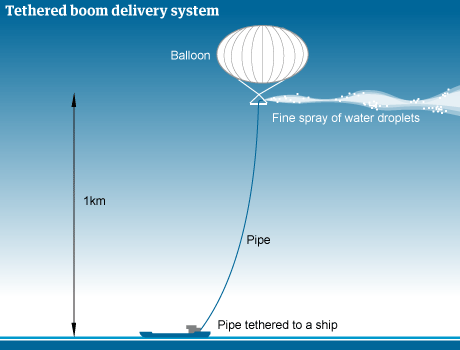Geoengineering experiment cancelled due to perceived conflict of interest
Two scientists involved in Spice project to simulate the cooling effect of volcanoes had submitted patents for similar technology
- guardian.co.uk, Wednesday 16 May 2012 14.13 BST
- Comments (24)

A controversial geoengineering experiment to simulate the cooling effect of volcanoes has been cancelled due to concern over a perceived conflict of interest with some of the researchers.
The experiment would have injected 150 litres of water into the atmosphere from a weather balloon via a 1km pipe tethered to a ship as part of the Spice project (Stratospheric Particle Injection for Climate Engineering).
Matthew Watson, a scientist at Bristol University and the principal investigator of Spice, told Nature magazine that two scientists involved in the project had not been initially forthcoming that they had submitted patents for technology similar to that used in the project before Spice was proposed.
This revelation caused some concern among the scientists involved, leading to the decision to axe the field-test, though they decided the lab-based element of the project should continue. Watson said other concerns had been raised about the lack of government regulation of geoengineering projects.
“This shows how commercial and financial interests can complicate the management of research on geoengineering, especially SRM technology, even if everyone agrees that it is safe. The project team have done the right thing, but this is an issue that needs to be explored in depth with stakeholders,” said John Shepherd, chair of the Royal Society’s geoengineering group.
“It’s a shame that the balloon experiment won’t be done now, as it would be really interesting to know if this technology would work, and I am quite sceptical about it,” he added. “However, it was always an optional extra to the rest of the project, which is scientifically much more important.”
Peter Cox, a professor of climate system dynamics at the University of Exeter, said in a statement: “It is regrettable that the field-trial aspect of Spice has now been cancelled, but it is vitally important that the remainder of the project, which is desk and lab based, should continue.”
Scientists at Spice – run by the universities of Bristol, Cambridge, Edinburgh and Oxford – had hoped the particles could mitigate the effects of global warming by diffusing sunlight before it reached the earth. The project was controversial, with groups including Friends of the Earth and the Canadian-based ETC Group raising concerns over the long-term impacts.
